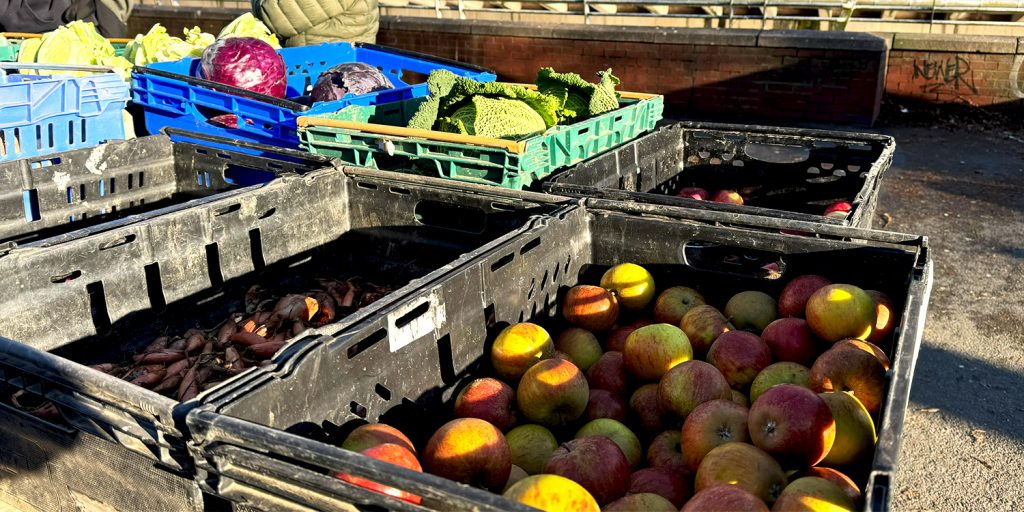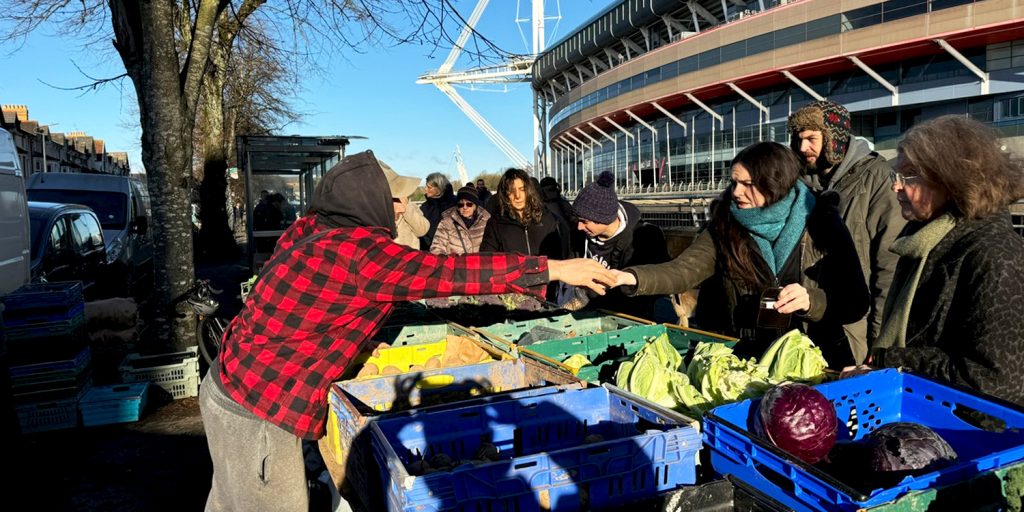The Welsh capital is trialling a support scheme to encourage shopping locally, but farmers at the market believe financial aid alone isn’t enough

Even on a rainy day in Cardiff, farmers markets are full of shoppers. Queues of people huddling under umbrellas wait for fresh bread or produce harvested from local farms in the early morning hours. Regulars at the market smile and nod to each other, and the vendors gratefully welcome each customer who chooses to shop locally.
Wales is on a mission to reach net zero by 2035. Cardiff Council wants to contribute to the goal by transforming how people think about and consume food, encouraging Cardiffians to eat more local and sustainably sourced produce.
The Food Cardiff Partnership was co-founded by the Cardiff & Vale Public Health Team and Cardiff Council in 2014. Its goals are to educate and help locals make more informed and healthy food choices and contribute to the net-zero goal.
This September, the partnership achieved the Gold Sustainable Food Places Award, a programme with ambitions to tackle food challenges across the UK.
One area of exceptional achievement that helped Cardiff achieve this was a good meal for everyone every day.
Watch this handy explainer below:
Reconnecting with real food
Wales’ farming industry generated £470 million in 2023, a 6% drop attributed to rising living costs, according to the Welsh government.
Organic produce and markets are often seen as a luxury, they remain pricey and less accessible for many people. Despite this, the UK organic market grew by 2% in 2023, although the percentage of organic farmland remains at 3%, according to the Soil Association.
Farmer Paul Wisniewski, 42, owner of Pauls Organic Veg, has one of the most popular fruit and vegetable stalls at Cardiff’s farmers markets, selling organic produce grown on his farm in Abergavenny.
Wisniewski collaborated with Food Cardiff’s Planet Card programme, part of the nationwide Bridging the Gap initiative helping people with low incomes access sustainable food.
Currently, in the second pilot phase, this scheme provides 120 eligible applicants with £11 a week to spend with selected vendors at the city’s farmers markets, helping them shop locally and sustainably.
A lot of people using the scheme are disconnected from food, so it’s great that the project brings them closer to real produce
The problem with such an initiative, says Wisniewski, is the extra work it creates for the farmers without significantly impacting the community.
He added that Planet Card holders often have little idea of what produce to buy and how to cook with it. Wisniewski says this slows down his already busy service, as he has to take extra time to explain what he is selling and how it can be prepared.
“A lot of people using the scheme are disconnected from food. It’s great that the project brings them closer to real produce, but more work needs to be done,” said Wisniewski.

It goes back to school
To truly create sustainable, long-lasting change, sustainability and food security issues need to be addressed early on through education, says Roath farmers market vendor and butcher Graham Hopkin, 67.
“We need to teach life skills, how to manage your money and how to cook nutritious meals,” he said.
Hopkin is not currently participating in the scheme but thinks it could benefit those who need financial assistance and help expose them to local produce.
Food Cardiff has partnered with a dietitian-led programme, Nutrition Skills for Life, to teach Cardiffians the skills to access and prepare sustainable food. Since 2021, over 3,000 people have accessed cooking and nutrition courses through the programme.
Despite the efforts, according to Senedd research, between 2021 and 2023, Wales saw a 41% increase in the number of food parcels distributed to people struggling to feed their families.
Wisniewski agrees that education is crucial and says: “We need to teach people how to cook and shop again. Schools and communities should have gardens. We must put the funding in the right place to teach people how to grow, harvest, and cook from the produce.”
Maria Mesa, 68, works closely with ethnic minority communities, mainly women. She took part in the first Planet Card pilot and thinks the scheme is important to asylum seekers and refugees who rely on food banks that often lack fresh produce.
Mesa also agrees that education is key and suggests that scheme participants should be taught the importance of eating organic produce to create long-term sustainable change.
“Some people may feel embarrassed because they’re getting something for free,” she said, “so introducing them to the market, creating more of a community and teaching them the benefits of organic food would make markets more accessible.”
Funding shortfalls
Currently, there isn’t enough funding to support all of Cardiff’s projects, says Pearl Costello, 32, Food Cardiff co-ordinator.
“We have to try to be smarter with how funding is used,” Costello said, “for example, there’s a cluster in central and south Cardiff who are collecting surplus food together and dividing it across projects.”
In 2022, the Welsh Government committed to funding cross-sector food partnerships in Wales in all local authorities to help improve food security and sustainability by allocating £2.5 million across the country, but this doesn’t seem to be enough.
Based on the data collected by Food Cardiff, there is a gap between those who are struggling with eating enough meals, which is around 15% and those who are accessing food banks, which is only two to three per cent of people.
To combat this, Food Cardiff promotes a cash-first approach, says Costello. They work closely with Cardiff Council to ensure people have the money rather than looking at food as the answer.
Shopping at farmers markets is undoubtedly a great way to support a sustainable local food economy. But without knowing how to use the produce, shoppers risk wasting both the farmers’ hard work and the food itself. Perhaps rethinking how to make every market visit count is as important as making the visit possible in the first place.

The Planet Card can be used at Roath Market and Riverside Market.
Participating vendors:
Paul’s Organic Veg
Coed Organic
Slad Valley Mushrooms
If you live in Cardiff and identify as experiencing a low income you can apply by following this link.
